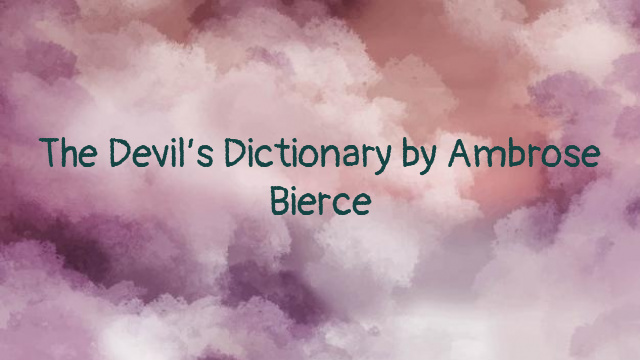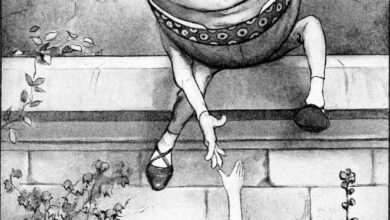
The Devil’s Dictionary by Ambrose Bierce
Originally published as The Cynic’s Word Book, Ambrose Bierce’s wickedly satirical “reference book” was retitled The Devil’s Dictionary in 1911.
Preface
The Devil’s Dictionary was begun in a weekly paper in 1881, and was continued in a desultory way at long intervals until 1906. In that year a large part of it was published in covers with the title The Cynic’s Word Book, a name which the author had not the power to reject or happiness to approve. To quote the publishers of the present work: “This more reverent title had previously been forced upon him by the religious scruples of the last newspaper in which a part of the work had appeared, with the natural consequence that when it came out in covers the country already had been flooded by its imitators with a score of ‘cynic’ books — The Cynic’s This, The Cynic’s That, and The Cynic’s Other. Most of these books were merely stupid, though some of them added the distinction of silliness. Among them, they brought the word “cynic” into disfavor so deep that any book bearing it was discredited in advance of publication. Meantime, too, some of the enterprising humorists of the country had helped themselves to such parts of the work as served their needs, and many of its definitions, anecdotes, phrases and so forth, had become more or less current in popular speech. This explanation is made, not with any pride of priority in trifles, but in simple denial of possible charges of plagiarism, which is no trifle. In merely resuming his own the author hopes to be held guiltless by those to whom the work is addressed — enlightened souls who prefer dry wines to sweet, sense to sentiment, wit to humor and clean English to slang. A conspicuous, and it is hope not unpleasant, feature of the book is its abundant illustrative quotations from eminent poets, chief of whom is that learned and ingenius cleric, Father Gassalasca Jape, S.J., whose lines bear his initials. To Father Jape’s kindly encouragement and assistance the author of the prose text is greatly indebted.
Having received an ultimatum from Austria, the Turkish Ministry met to consider it.
"O servant of the Prophet," said the Sheik of the Imperial Chibouk
to the Mamoosh of the Invincible Army, "how many unconquerabl
e soldiers have we in arms?" "Upholder of the Faith," that dignitary
replied after examining his memoranda, "they are in numbers as
the leaves of the forest!" "And how many impenetrable battleships
strike terror to the hearts of all Christian swine?" he asked the
Imaum of the Ever Victorious Navy. "Uncle of the Full Moon,"
was the reply, "deign to know that they are as the waves of
the ocean, the sands of the desert and the stars of Heaven!"
For eight hours the broad brow of the Sheik of the Imperial
Chibouk was corrugated with evidences of deep thought: he was
calculating the chances of war. Then, "Sons of angels," he said, "the
die is cast! I shall suggest to the Ulema of the Imperial Ear that he
advise inaction. In the name of Allah, the council is adjourned."
"Then I'll be damned if I die!" "My son," said the priest, "this is what we fear."
His understanding was so keen
That all things which he'd felt, heard, seen,
He could interpret without fail
If he was in or out of jail.
He wrote at Inspiration's call
Deep disquisitions on them all,
Then, pent at last in an asylum,
Performed the service to compile 'em.
So great a writer, all men swore,
They never had not read before.
Jorrock Wormley
The owner of a powder mill
Was musing on a distant hill --
Something his mind foreboded --
When from the cloudless sky there fell
A deviled human kidney! Well,
The man's mill had exploded.
His hat he lifted from his head;
"I beg your pardon, sir," he said;
"I didn't know 'twas loaded."
Swatkin




